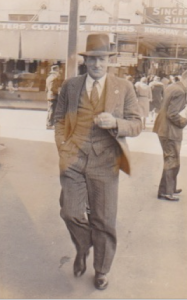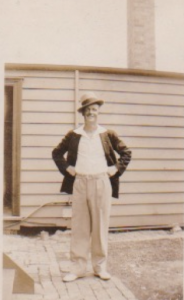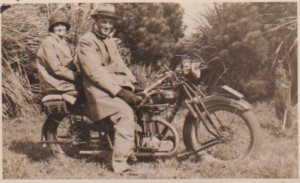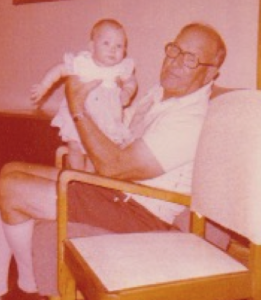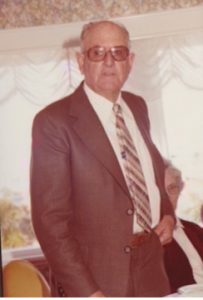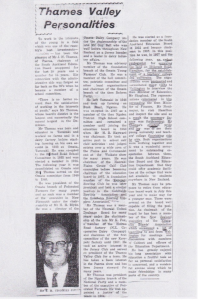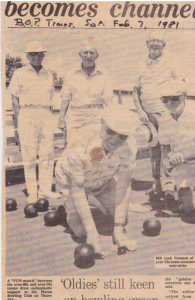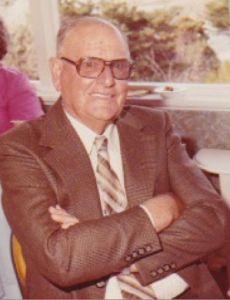
Born: 29 January 1906, Horoeka, New Zealand
Parents: Joseph William THOMAS and Helena Caroline KEEGAN
Click here for video and story about Joseph William THOMAS (father of Jack Heaton THOMAS)
Married: Jessie HALLAM 30 June 1931, St Barnabas Church, Mt Eden, Auckland, New Zealand
Died: 27 February 1986, 161B Levers Road, Matua, Tauranga, New Zealand

In His Own Words….
“Started school in Purangi. Only went to school for a few weeks there. Shifted to Douglas where I walked 3 miles to Huiroa School for 2 years and then changed to Douglas School. We lived between Douglas and Huiroa, with 2 miles of mud road to Huiroa and metal all the way to Douglas. Finished Pr. School at Tarurutangi where I was granted my Proficiency Certificate without sitting an exam. Cycled 8 miles to New Plymouth Boy’s High from Barratt Rd for 2 years, after which I worked on the farm for a few years. Then worked for one or two other farmers and then in the Okato Factory for about five years where I was second assistant and earned five pounds – 2/6 weekly. When I got married I took over the Hurford road farm after my mother died. “
As well as all of the farming activities required of Jack while raising a family he was very involved in the Hauraki Plains Community. He was Chairman of the South Auckland Education Board for 10 years, President of the Omata Branch of Federated Farmers for many years, Director of the Omata Dairy Company, Advisory member of the foundation branch of the Omata Young Farmers’ Club, Hall committee, Patriotic committee and other local organisations, Chairman of the Omata branch of the then Reform Party. Co-opted in 1947 as a member of the then Ngatea District High School committee and remained a member until joining the education board in 1953. Jack took an active part in school calf club activities and judged entries over a wide area of the Plains and Coromandel and at the Waikato show. He was chairman of the Hauraki Plains Group Calf Club committee before becoming chairman of the education board in 1957. He took an active interest in the Jersey Club and served as president of the Thames Valley Club for a term. He took a keen interest in the Paeroa show and was Jersey steward for many years. He was an executive member of Federated Farmers. Appointed a justice of the peace in 1964. Elected as a foundation member of the South Auckland Education Board in 1953 and became chairman in 1957. In this position he was, in 1957 and the following year, an ardent protagonist for acquiring the land on Hillcrest Road, Hamilton for the establishment of a teachers’ college and University.
Jack had smoked when he was a child. However when he retired from the farm it began to be socially unacceptable, particularly for one who was a role model in education. The Prime Minister Nordmeyer increased the tax on tobacco. After that Jack declared that he would not smoke again and he abruptly stopped what had been a life-long habit.
Jack had a few hobbies. He was a foundation member of the Kerepehi Bowling Club and later he was president. He held similar positions in the Goldfields Bowling Association.
He had another more expensive hobby. He loved cars and liked to change his car every year. He took great pride in this even though it was something his family joked about.
Sayings that Jack drilled into his children:
- It’s not the number of times you fall that counts, it’s the number of times you get up again.
- If you think someone is saying something bad about you, live so that no one will believe it.
- Do what you can, in as many places as you can, for as many people as you can, as often as you can, if you can
- The Man who never made a mistake never made anything
The story below was contributed by Pat Wood nee Thomas
Jack and Jessie first met when Jessie was only 12 years old. Jack’s mother, who lived in Taranaki, invited Jessie’s mother to take the children by train from Auckland to New Plymouth. The two mothers were sisters who had been very close friends and singers – both music teachers. Jessie remembered Jack at that time as ‘just a boy!’
When Jack was in his late teens, he took his mother (by car which was really impressive in those days!) to visit Aunty Agnes. Jessie was by then 18 and the weather was bad. Jack had to bravely drive through fords on his way. Jessie was impressed. Her father had died by this time and a romance started with Jessie. They corresponded for a number of years and desired to get married but because they were first cousins a marriage was illegal. It was for this reason that Jack sent his letters to Jessie at her office. They obviously felt that things weren’t OK being cousins. Eventually realising the romance was serious, Jessie’s mother confided to Jack that there had been an illegitimate birth in the family and they were only in fact half cousins. It was never explained as to how or who was illegitimate, and remains to this day a secret.
Jack walked Jessie up Mt Eden one evening, and placed an engagement ring on her finger (which she later sold to make ends meet during the depression). The marriage however, was delayed for a year because they were both earning good money, and it was decided to give Jessie another year at her job in order to have enough finance to set up home. Altogether they corresponded for five and a half years!
Jack and Jessie’s first home was in a dairy factory house close to Jack’s employment in Okato. Having both saved a bit they were able to buy some brand new furniture that included an Oak bedroom suite, a lounge suite, and a treasured tea wagon. Jack’s father later invited him and Jessie to help on his farm at Hurford Road as it needed much work breaking it in from rugged gorse and blackberry country. While working on the farm they lived in a small house next door to Jack’s parents Joe and Lena. Their first two children were born while they lived in this house. Hurford Road in Omata was considered real back blocks in those days, though only eight miles from New Plymouth; it was a very narrow, metal, no exit road. All the neighbours knew each other and worked well together. The town of Omata consisted of a three roomed school, a hall, church, butcher and a general store. Mt Taranaki was visible from the house. The front paddock of the house had a mountain stream running through it and Jack dammed part of the creek so that the children had a swimming hole.
In 1935 Jack’s mother died suddenly. Jack was only 29 years old. His father Joe went away not able to deal with the loss. Jessie at this time received a surprise inheritance from Aunt (Emily HALLAM) who she had never met. As Jack’s father never returned, the money helped to do up the big house so Jack and Jessie took over the farm that had many debts. They remained there during depression years and Jack grew a large vegetable garden during wartime when food was rationed and also had a few fruit trees. He worked hard on the farm through the years of the Second World War and accompanying depression. He improved the farm considerably, and became the first in the district to make concrete fence posts on which he engraved his initials and date. These fence posts were still there in 2000. Jack worked with horse and sledge to feed out, raised pigs fed on separated milk. He also raised ducks in a pond near the cowshed. The front paddock was the first to be cleared and neatly fenced. There was a long bush track entrance into the farm property that his father Joe had enhanced with rhododendrons, laurels, honeysuckles and various plants of interest.

During the depression years there was busy farm work and like all New Zealand mothers, Jessie stood in long queues with ration tickets to purchase her sugar, butter, and other rationed food during the war. Once a week she joined other ladies in the district at the local hall, and wrapped parcels of gifts for the soldiers who were overseas. It was a friendly neighbourhood and there were weekly dances that included the children and card playing evenings which all helped cope with the hard times of the war.
In 1946 Jack left home for a time to look for another easier farm. He bought a 100 acre farm at Ngatea for 75 pounds per acre so the family moved to the Hauraki Plains. This was wet swampy clay land. Jack successfully grew a vegetable garden by adding crushed shell to aerate the sticky soil. The previous owner had cruelly treated the herd of cows he purchased. Many had been scalded and were deprived of their coats, and carried scars. The move from Taranaki was a big adventure that took two days following a large truck with the furniture. The house was a huge up-grade from the Taranaki one, and one of the nicest in the district.
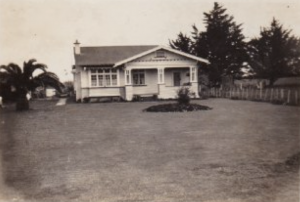
Jack and Jessie’s son Bryan had been in boarding school and when he returned to the new farm at Ngatea he encouraged Jack to raise pedigree animals that were given the name ‘Crescent Jerseys.’ The farm is still owned by descendants of Jack THOMAS and they still raise ‘Crescent Jerseys.’
In the early days at Ngatea Jessie helped in the cowshed but when son Bryan returned from boarding school, he took over that role. But during haymaking season Jessie worked all day on ‘the herdy-gurdy- which Jack invented as an electrical means of working the grab to hoist the hay onto the haystack. Jessie was not mechanically minded, and invariably the hay went down instead of up, or even fell out of the grab, much to Jack’s frustration, and her consternation! But never-the-less, haymaking for many years was a family programme. Jack built the stack, Bryan worked the grab, Jessie was on the herdy-gurdy all day in the hot sun (Jack erected a sun-shade for Jessie). Marie drove the rake, and Pat was appointed to keep the cold drinks coming and supply the food.
Family holidays did not exist throughout the years of raising their family but Jack and Jessie sometimes had a short while away by themselves in winter leaving Jessie’s mother with the children.

Running a farm is hard work but there was family time as well and Jack encouraged the family to play cards with him in the evenings. He also enjoyed a game of chess or a race at the crossword puzzle.
When son Bryan had to leave the farm due to ill health Jack built a worker’s cottage and hired a Dutch immigrant by the name of Jon Van Noodt.
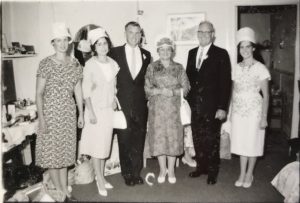
When Jack and Jessie sold the farm to Daughter Marie and her husband Gray Townsend in 1959 it was a Crescent Jersey Stud. They retired to Willoughby Street, Paeroa, New Zealand. By this time Jack was heavily involved with Education Board responsibilities, and Jessie spent many small periods (2-3 days) alone while Jack was in Wellington with the Minister of Education or on some other education responsibility. She handled this quite well, and thrived on the end of year prize-givings when day after day Jack spoke at schools, presented the prizes, and Jessie sat on the platform with a new bouquet each day. These were real honorary years for them both, and a far cry from their early beginnings in Taranaki.
Jack enjoyed fishing so they moved to Whitianga where Jack built his own retirement cottage. They liked the small community where everybody knew everybody and all pulled together. Jessie maintained her garden and church interests and joined various craft groups, as was necessary in Whitianga in order to build friendship. She tried basket-making, did knitting, made beads, and a variety of handwork and crochet. They both also enjoyed games of cards, mainly 500, which they had always played, and together formed quite an imposing team.
However in 1972 after a few years the isolation accompanied by a few very bad storms saw them move to Tauranga where there were more attractions. Their last home was 161B Lever’s Road, Matua.
During the mid eighties it became apparent that Jack had terminal cancer. Jessie did not come to grips easily with the fact that he was going to die before her however she battled through his death with some counselling and on 27 Feb 1986 Jack died in their lounge at 3am while Jessie had fallen asleep beside his bed with her head resting on his hand. They had a fond marriage of 55 years and had a peaceful home.
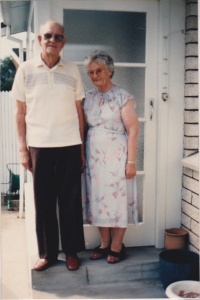
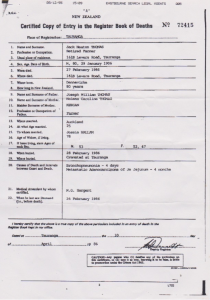
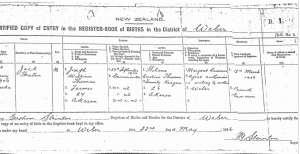
Click here for video and story about Joseph William THOMAS (father of Jack Heaton THOMAS)
